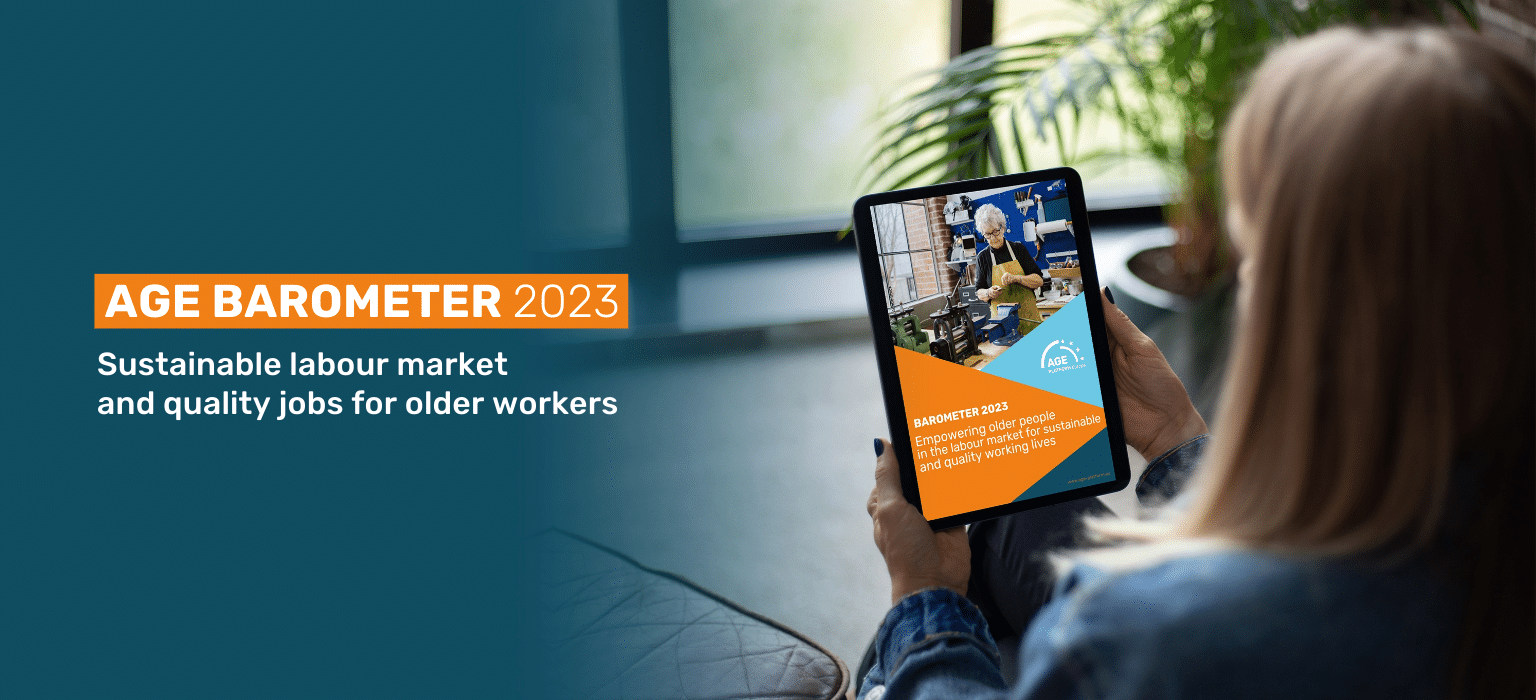Germany
Information provided by BAGSO – Bundesarbeitsgemeinschaft der Seniorenorganisationen (German National Association of Senior Citizens’ Organisations), and desk research

Support in the labour market
Germany has an employment rate that is higher than the European average. However, as in most, if not all, European countries, the employment rate decreases drastically between the age groups 55-59 (80,7%) and 60-64 (63.2%).
Since 2006, the Demography Network Association set up by the Federal Ministry of Labour and Social Affairs has been promoting examples of good practices to develop sustainable and successful employment strategies in companies. From the start, cross-company exchange has been the central instrument of the association. In addition to a steadily growing number of thematic working groups, a regional network structure has also been developed, some of which still exist today. Also supporting the corporate sector, the “UnternehmensWert: Mensch” programme, launched in 2014 and funded by the Federal Ministry of Labour and Social Affairs and the European Social Fund, supports small and medium-sized enterprises (SMEs) in developing employee-centred human resources strategies in the face of demographic and digitalisation changes in the labour market. Today, there are about 110 initial counselling centres for human resources management counselling and advisory services and approximately 1,500 process advisors active throughout Germany.
In terms of tools to support older workers in career management, lifelong learning is promoted through continuous vocational training implemented by The Federal Employment Agency, which is covered up to 100% of older employees. The WeGebAU initiative of the Federal Employment Agency specifically serves the further training of low-skilled and older workers. The Federal Employment Agency also offers a wide range of support to guide employees of all ages in their desire to know about career perspectives and reorientation such as career counselling, including re-entry counselling, Vocational Psychology Service, medical service and helps with hints and tips for business start-ups. A more specific approach to older people is offered by initiatives such as ProfilPass which advises on reorientation, new orientation, and counselling for the post-professional phase, with the scientific support of the German Institute for Adult Education (DIE). An interesting tool called Job Futuromat has been set up by the Institute for Employment Research (IAB) to determine how a profession could change because of digitalisation.
The action programme Perspektive Wiedereinstieg is aimed at people who want to reorient themselves professionally, get information on informal care and work, or return to work after a career break. The programme particularly supports women who wish to return to work after several years of family leave. All in all, the situation of older women in the labour market is supported by several gender equality measures of the Federal Government, including measures for equal participation of men and women or to promote transparency of pay structures.
In Germany, older people continue to receive proportionally little support for (re-)employment and their chances of (re-)employment in formal work are lower compared to younger people. Municipal employment agencies provide support in job search up to retirement age, but the support ratio in employment services is too low for this target group and the duration of the meetings is too short. Although, it is worth mentioning the Perspektive 50plus programme from the Federal Ministry of Labour and Social Affairs that aims to provide job opportunities and to re-integrate older people aged between 50 and 64 into the labour market. Even if the programme officially ended in 2015, some regions are still pursuing it. Support can also come from associations such as Mice for Older People which offers jobs for older people and counselling services for pensioners who want to continue working in several cities. The association has an interesting programme gathering people in “success teams” with the aim to meet fortnightly for three months and help each other realise personal goals on the topic of “Working 60+”. It offers the opportunity to work on one’s own goals in a committed way, get advice from people in the team and learn from each other’s approach.
Guidance when approaching pensionable age is also provided by more than 460 senior citizens’ offices across the country with counselling, workshops as well as orientation and accompaniment in taking up voluntary work. Several organisations also offer information, such as AGE member BAGSO through its guidebook, and BAGSO member organisations through seminars or programmes focusing on post-retirement counselling. Another noteworthy initiative that raises the profile of older workers is the prize awarded to social entrepreneurs aged 60 and over by the Körber Stiftung. The prize honours three personalities per year who have found solutions to the social challenges of our time using entrepreneurial means, and who have succeeded in creating a company or social enterprise to do so.
In terms of legislation, the Flexi Pension Act seeks to make flexible working up to pensionable age more attractive and facilitates continued working beyond pensionable age. Its objective is to facilitate the employment of older people and create more attractive opportunities for pensioners. Unfortunately, it has been rarely used so far.
Age discrimination in employment
The General Equal Treatment Act (AGG) is the set of regulations implementing the EU anti-discrimination directives in Germany. A study commissioned by the Federal Anti-Discrimination Agency, called “Protection against Discrimination and Promotion of Personal Diversity in Working Life: Status of Implementation and Practice in Companies, Public Administrations and Third Sector Organisations”, points out that the AGG has contributed to changing the behaviour of employers. However, the impact of the AGG is examined in very few companies and only reflected in the adoption or not of regulations and instruments available to employees. This study also shows that “Administrations (…) have overall better knowledge of the AGG than companies and to some extent third sector organisations. (…) While all large companies are very well informed, similar to the administrations, more than half of the small companies do not know the AGG.” In principle, the legal process is accessible to all, but lack of knowledge about the AGG and about complaint mechanisms makes it difficult to implement the right to non-discrimination on the basis of age. In practice, the Federal Anti-Discrimination Agency advises people who experience discrimination and refers them to other advice centres. Trade unions are also seen as important interlocutors.
In support of employers seeking to develop a diversity and inclusion strategy, the Charta der Vielfalt provides a lot of information on the different dimensions of diversity and has a large pool of resources, including on the age dimension. Similarly, the Chambers of Commerce and Industry highlight the assets of older workers and encourage the business sector to address demographic challenges with specific tools. Among those good practices, intergenerational collaboration at work is encouraged in a dossier published by the Diversity Charter, which highlights good practices in the corporate, public and social sectors such as “bringing older and younger staff together in intergenerational workshops that promote knowledge sharing and exchange of experience, but also mutual understanding of different life situations”. Here too, Trade Unions provide support through seminars on the benefits of age-diverse teams and inclusion.
Workplaces for all ages
The Federal Institute for Occupational Safety and Health (BAUA) compiles the basic principles and fields of action for age-friendly workplaces. With regard to occupational health and safety, the study points out that “as ageing is a cross-cutting issue, it must be the subject of a coordinated procedure between all the areas of responsibility concerned (personnel, organisation, management, occupational health and safety) and provide for occupational health and safety assistance, occupational health management (OHM), occupational health promotion (OHP) and occupational integration management (OIM)”. For strenuous professions, managers should implement measures such as mixed work and job rotation, healthy shift planning with sufficient rest, free time in blocks and breaks.
Employers can receive financial assistance in the form of grants and loans up to the full amount of the costs if they equip new or existing workplaces and training places for people with disabilities – for example by providing suitable access, disposal or sanitary facilities. For disability-specific aspects (e.g., visual impairment and hearing impairment), the technical advisory services of the Integration Office (Inklusionsamt) or the Federal Employment Agency provides support.
The Joint German Occupational Safety and Health Strategy (GDA) is a long-term platform of the federal government, the Länder and the accident insurance institutions, anchored in the Occupational Safety and Health Act and Book VII of the Social Code. Within this platform, the Psyche work programme focuses on support for companies, qualification of supervisory staff and revision of regulations, especially regarding stress at work. A similar interdepartmental initiative called Mental Health Offensive aims to improve the networking of prevention services in general.
Federal Ministries such as the Federal Ministry for Labour and Social Affairs and the Federal Ministry for Health also offer material and practical tools for well-being and mental health at work. Similarly, the New Quality of Work Initiative (INQA) project psyGA – Mental Health in the World of Work offers e-learning tools for managers and employees, as well as practical aids and examples.
Finally, many projects focus on the acquisition or renewal of digital skills for seniors. Some of these projects are summarized in the DigitalPakt Alter, a joint initiative by the Federal Ministry for Family Affairs, Senior Citizens, Woman and Youth and BAGSO, aimed at strengthening the social participation and engagement of older people in a digitalised world. This is also the case of the Digital-Kompass, a meeting place for all questions on the internet, developed by BAGSO, in cooperation with Deutschland sicher im Netz e.V. and funded by the German Federal Ministry for the Environment, Nature Conservation, Nuclear Safety and Consumer Protection (BMUV).
In terms of work-life balance, BAGSO demands the introduction of wage replacement benefits for people taking on care responsibilities. While Germany, already in 2019 when the EU directive was introduced, provided for higher standards then required through the directive, there is still room for improvement, as highlighted in the recently published Report of the German Independent Advisory Board on Work-Care Reconciliation.
This country assessment is part of the 2023 edition of AGE Barometer dedicated to employment, which you can download below. Find out more online here.
COUNTRY ANALYSIS
Contact

Sarah Loriato
Policy Officer on Employment and European Parliament Liaison
Sarah is in charge of AGE’s policy activities in the fields of employment, participation and active citizenship in old age. She also monitors EU initiatives on volunteering for older people and lifelong learning. She is responsible for the Task Force dedicated to on Employment, participation and active citizenship. Sarah also coordinates AGE’s relations with the European Parliament (EP).



